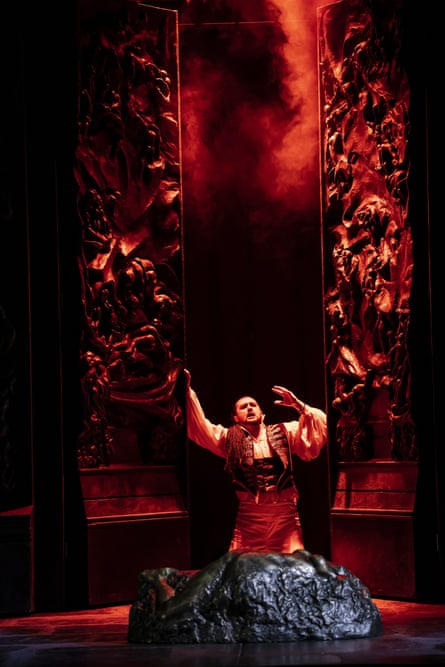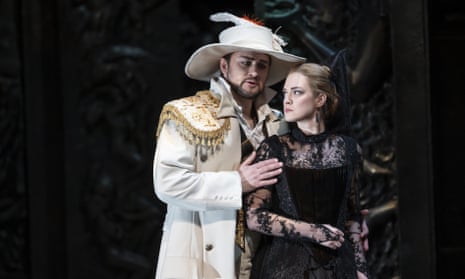Downright deceit, charm, wronged women determined to avenge, a raging storm … Mozart’s opera about the pathological liar and libertine could hardly seem more contemporary. When Welsh National Opera’s 2011 production was revived in 2018 – circa #MeToo – it appeared timely, but, with this latest revival, perhaps the reality is that it will always be so.
Designer John Napier’s set, inspired by Auguste Rodin’s The Gates of Hell, creates the suitably tenebrous background to original director John Caird’s concept, underlining what is already the spoiler-alert of the title, Don Giovanni or The Dissolute Punished. The ironically whiter-than-white garb of the dashing don and the grey of his servant Leporello go against the setting’s general darkness, while the other costumes reflect the burnished colours of Spanish Golden Age. Yet, from the outset, Mozart and his librettist Lorenzo da Ponte’s mix of serious and the jocose has always meant that the audience is appalled and amused by turns. This is an infinitely delicate balance, so it was unfortunate that conductor Tobias Ringborg hurricaned his way through the overture, with the problem of raggedness never quite resolved for the rest of the evening.

In the title role, Ukrainian Andrei Kymach, the 2019 BBC Cardiff singer of the world, is an imposing and saturnine presence on stage, though the subtler colours of his baritone were too often lost early on: it was only in the second act that he projected much more potently the air of defiant arrogance and entitlement. As Leporello, Simon Bailey’s impeccable diction allowed the comedic element of the master/servant exchanges to come over strongly.
The hapless Donna Elvira was sung by Sarah Tynan, as feisty as she could be given the ambivalence of Elvira’s fluctuation between love and hate for Don Giovanni. The outstanding singing came from Marina Monzó as Donna Anna, in an elegantly expressive and technically perfectly placed performance, anger and anguish at her father the Commendatore’s murder controlled without ever losing sight of Mozartean finesse. Her Don Ottavio, Trystan Llŷr Griffiths, made the most of his big arias, apparently more fearless than the character he portrayed. Harriet Eyley’s Zerlina and James Atkinson’s Masetto were well matched.
This production still feels undermined by the statue – albeit draped – of the Commendatore being on stage from curtain up and before his actual murder, denying James Platt’s stone guest the final dramatic denouement. At least, the requisite punishing flames engulfing Don Giovanni do bring the image of the gates of hell full circle.
Don Giovanni is at the Wales Millennium Centre, Cardiff, 26-27 February and 17 March, then tours until 13 May.

Comments (…)
Sign in or create your Guardian account to join the discussion